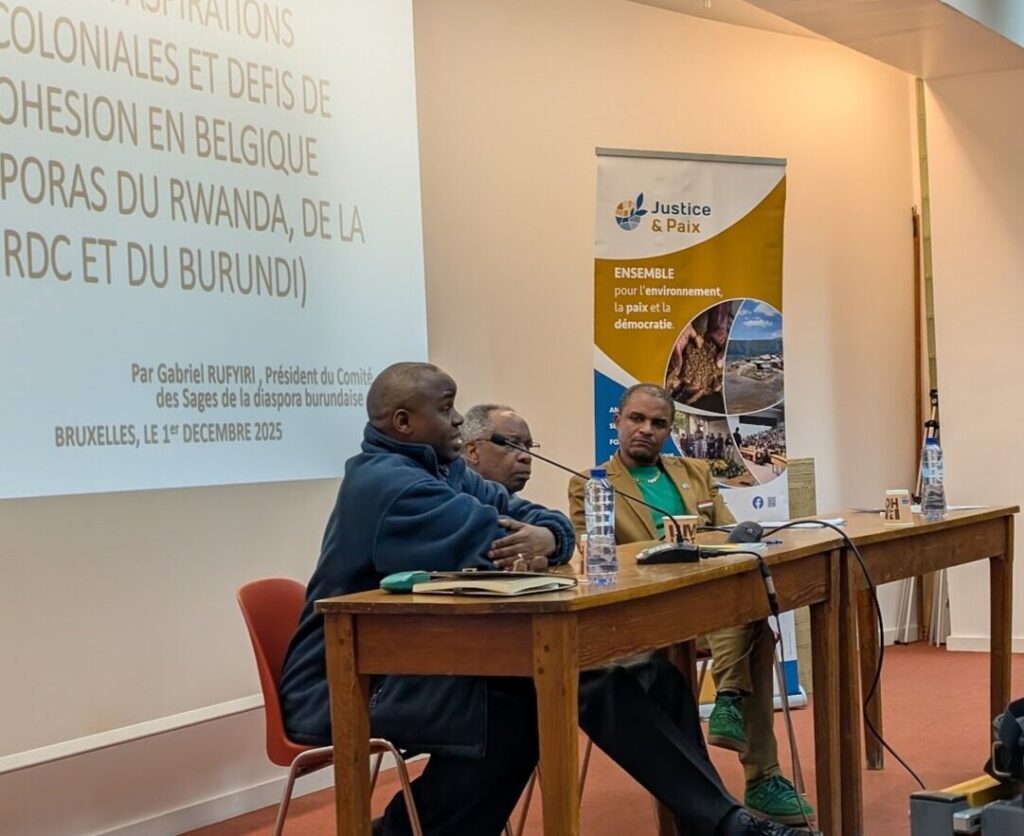Taking into consideration the different roles that women can play in times of war and developing and improving policies on specific gender issues are the challenges launched during the adoption of Resolution 1325 by the UN Security Council in 2000.
The mission organized by Justice and Peace in February 2008 to the east of the Democratic Republic of Congo confirmed on the one hand the horror of the war raging there, on the other hand the need for the various actors present (NGOs, Belgian journalists and parliamentarians) to be more than attentive to the situation of sexual violence used as a tactic of war. [1]See article in this Justice and Peace file: “Democratic Republic of Congo: are rapes and sexual violence used as a war tactic in South Kivu? »
The International Community is present and ready to support steps to repair the psychological, medical and socio-economic damage experienced by the victims and their loved ones. Thus, Belgium, through the action of Development Cooperation, financed in 2004 a four-year program aimed at providing survivors of sexual violence in the DRC with medical, psychological, socio-economic and legal support.
However, we wish to emphasize the importance of also a preventive approach which sends a strong signal to those responsible for these acts.
Sexual violence is not a new weapon of war. To cite just one example, in Peru during the civil war that ravaged the country from 1980 to 2000, women and girls in rural communities in the Peruvian Andes were victims of systematic rape, not only by insurgent movements Shining Path and Tupac Amaru, but also from the armed forces supposed to defend civilians. These facts of the past today represent an important issue in the fight against impunity in Peru.
Indeed, the final report of the Truth and Reconciliation Commission (TRC) of Peru, published in 2003, is the starting point for attempting to repair, among other things through legal means, the victims of human rights violations. Unfortunately, the Peruvian Penal Code does not define sexual violence committed during war as a crime against humanity. Therefore, the facts which are brought before the courts are only judged as acts of “simple” rape. The penalties are therefore less severe. What strong signal can therefore be given to belligerents from other countries?
The article “Democratic Republic of Congo: are rapes and sexual violence used as a war tactic in South Kivu? » shows us that sexual violence used as a tactic of war does not only affect women and girls, but also men. War spares no one. More and more civilians are affected, either directly (direct targets) or indirectly because they suffer the effects of conflicts (human rights violations, population displacements, etc.).
Furthermore, according to the report of a conference on children in war organized in 2002 by the Women and Development Commission (see box) in collaboration with Unicef, 80% civilian victims are women and children.
According to the International Committee of the Red Cross (ICRC), “While it is the vast majority of men who are killed, detained or missing during war, women, in times of armed conflict, are increasingly targeted in as civilians and are exposed to sexual violence. In addition, they generally bear all the responsibility for ensuring the daily survival of their family. [2]“Women and war”, ICRC, February 2008.
War and violence affect everyone but in very different ways depending on the roles assumed by each. Victims, combatants or “peacemakers”, women can have very different roles in times of war and it would be wrong to confine them to their “vulnerability”.
Women can have a multitude of identities: sometimes it is women who must fill the social and economic void left by men who left to fight, sometimes it is also women who take part in the fight. These are realities that the International Community, States and civil society must take into account in establishing and implementing their policies.
Women are therefore not just victims and it is necessary to strengthen them in the roles they can have to emerge from the conflict and participate in building peace and development within their family, their community... and from their country.
For feminist movements, “empowerment” [3]Strengthening its social role women is a necessary condition for the consolidation of peace. This term, difficult to translate into French, designates the acquisition of autonomy and power in the different spheres of society: family, sociocultural, economic and political.
Taking into consideration the different roles that women can play in times of war and developing and improving policies on specific gender issues are the challenges launched during the adoption of Resolution 1325 by the UN Security Council in 2000.
United Nations Resolution 1325 on women, peace and security calls for:
- increase the representation of women at all levels of decision-making in conflict prevention, management and resolution;
- grant special protection to women and refugee populations during conflicts;
- increase assistance to women peace activists;
- end impunity for sexual crimes, including gender-based violence
- increase the participation of women in peacekeeping operations and in the post-conflict process;
- take gender issues into account in UN reports and Security Council missions.
Resolution 1325 is a very interesting political tool. Firstly because it draws international attention to a reality that must be taken into account. Then, this resolution establishes a framework and provides guidelines so that each country can undertake concrete actions. Finally, it is a useful instrument for civil society in both the South and the North.
With this resolution, civil society has a tool allowing it to put pressure on governments to take responsibility in these matters. Indeed, it is an international law that members of the United Nations are required to respect. Finally, this resolution is also a tool that can be used for training and local awareness.
More and more countries are taking steps to adapt their legal and policy frameworks to this provision. National action plans have been adopted by different countries to implement Resolution 1325. This is the case, for example, of Spain, which wished to integrate issues related to human gender into its peacebuilding policies, or of Liberia. (a country that has suffered 14 years of civil war and where half of its women have been victims of sexual violence) which has formulated a national policy to prevent and manage cases of sexual violence.
Based on United Nations Resolution 1325, the European Parliament adopted a resolution in 2006 [4]Resolution 2005/2215 of the European Parliament on the situation of women in armed conflicts and their role in reconstruction and the democratic process in countries in situations of … Continue reading which not only emphasizes the need for justice and access to health for women victims of sexual violence but also notes that women still do not benefit from full participation in the prevention and management of conflicts. She insists on the responsibility that States have to support educationally, politically and legally women's peace movements.
In this same resolution, the European Parliament says that “the problem is therefore less to make new recommendations than to define the vectors of their implementation, to measure the obstacles and to control the results”.
The problem therefore does not lie in the absence of law. The main issue today lies in the application and respect of the law.
Like any international standard, the influence of Resolution 1325 is limited because even if it is obligatory, there is no coercive measure. Furthermore, it is currently difficult to measure the impact that this resolution has on women because there is no monitoring mechanism and there are no qualitative and quantitative indicators to assess its implementation. .
The application of this resolution is therefore a challenge for the governments of the South and the North but also for civil society.
Many actions can be implemented following the example of some existing initiatives. In West Africa, the West African Peacebuilding Network broadcasts in its radio program “Voices of Women” the content of Resolution 1325, adapting it to local realities. In Germany, the campaign “There are 1325 reasons to implement United Nations Resolution 1325” made it possible to collect and send to the government the 1325 reasons that civil society has to push it to implement the Resolution .
Axelle Fischer
It's good to know…
In Belgium, the Women and Development Commission (CFD) was created in order to support and strengthen the consideration of equality between women and men in the formulation and implementation of the Belgian Development Cooperation policy. Development.
The CFD has 14 French- and Dutch-speaking representatives from women's organizations, non-governmental development organizations, universities, the General Directorate of Development Cooperation, as well as 10 specialist experts in gender equality.
To know more…
-Dossier “Women and war”, International Committee of the Red Cross, February 2008.
-Dossier “Sexual violence: weapon of war, obstacle to peace”, Forced Migration magazine, March 2007.
-Campaign " The strength of women, a force for peace »
–Resolution 1325 (2000) of the United Nations Security Council
-THE website of the West African Network for Peacebuilding broadcasts in its radio program “Voices of Women” the content of Resolution 1325, adapting it to local realities.
-THE website of the Center for the Democratic Control of Armed Forces (DCAF) in Geneva which offers a toolbox on gender and security sector reform.
Attachments
Notes[+]
| ↑1 | See article in this Justice and Peace file: “Democratic Republic of Congo: are rapes and sexual violence used as a war tactic in South Kivu? » |
|---|---|
| ↑2 | “Women and war”, ICRC, February 2008. |
| ↑3 | Strengthening its social role |
| ↑4 | European Parliament Resolution 2005/2215 on the situation of women in armed conflicts and their role in reconstruction and the democratic process in post-conflict countries. |




